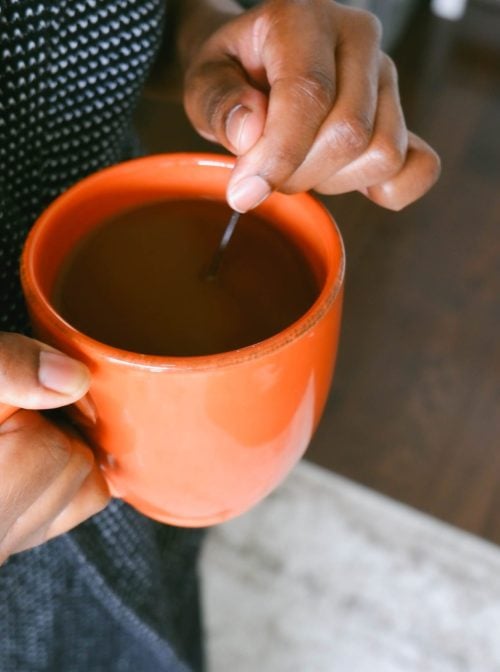The unexpected social isolation of the pandemic forced a drastic slowdown in many areas of my life. Instead of rushing to work every day, there were days I would be alone at home. And as a self-declared extrovert, this often left me deeply anxious. I had spent years surrounded by people – I was afraid to be alone.
My husband and I began learning to make pour-over coffee during this time. On quiet weekday mornings, before I started a day of virtual meetings, I would groggily grind coffee beans, heat water, and carefully measure into my coffee filter. I would slowly pour water over the ground beans and allow my mind to wander – using the time to acknowledge my fear for the safety of my fellow health workers, to pray for the families impacted so far, and also to find peace in doing as much as I could in the areas in my control.
In the years since I’ve come to appreciate how those mornings became a precious source of well-being. Even though I was alone, I learned how to feel less lonely. This time by myself allowed me to process my thoughts and slowly understand myself. I could acknowledge what brought me joy and what caused me grief – this was when I needed to learn to remain in my own company. I realized I was showing up with a more significant presence for the patients I cared for and my community of friends and family. I came to appreciate the beauty of solitude.
Building a community is one of the most important ways to support our well-being. It is one of my greatest life passions and the cornerstone of my organization, Introspective Spaces. In our pursuit to build relationships, we often fill every waking moment with different forms of human contact – on social media, through email, work meetings, and happy hours. Given the public health impact of loneliness, these are important for social connection. Yet what many of our social endeavors fail to incorporate is the necessity of slowing down and taking time to get to know ourselves. Building long-lasting, sustainable, and meaningful relationships can only happen when we are comfortable alone.
Surgeon General Vivek Murthy’s book “Together,” focused on the public health impact of loneliness, aptly articulates this paradox – time in solitude is necessary for strengthening relationships and building community. He draws upon an essential distinction between loneliness and solitude. In times of solitude, when we are involved in our work or creative pursuits, we can be alone and not feel lonely because we are often in a state of “peaceful aloneness.” In contrast, loneliness is the feeling of being emotionally isolated – as a result, we can be surrounded by people and still feel lonely. Loneliness can often be associated with sensations of shame. Solitude, in contrast, can be spiritual.
Solitude offers the chance to build self-knowledge and understand what we love, value, fear, or dread.
Solitude offers the chance to build self-knowledge and understand what we love, value, fear, or dread. This opportunity for reflection helps us learn who we are and gives us the foundation to engage with others while remaining grounded. The need for this type of reflective practice is found across many faith traditions. In Thomas Merton’s book “The Wisdom of the Desert,” he writes, “What can we gain by sailing to the moon if we cannot cross the abyss that separates us from ourselves? This is the most important of all voyages of discovery, and without it, all the rest are not only useless but disastrous.”
In my own Buddhist/Hindu faith tradition, solitude is an essential part of our spiritual practices. Meditation is a practice focused on cultivating inner peace and ease. It often begins with focusing on our breath and observing the thoughts that come across our mind without judgment or attachment. Even though my meditation practice is sporadic at best, it has taught me the power of slowing down and taking moments of pause. I embody this practice of slowing down when I meet new people – something that occurs numerous times a day during my shifts in the hospital. Knowing that I feel comfortable with myself helps me meet people from different backgrounds and beliefs and approach each conversation with curiosity and a willingness to connect. At the end of the day, when my energy stores feel low, my commute home or a brief meditation offers me small moments to recharge. I’ve learned to build solitude into my life while maintaining my relationships.
The practice of solitude is not a part of our cultural practice – it can be hard to carve out time to be alone. It’s even harder to find comfort with it. Yet connecting with ourselves is essential to strengthening our ability to communicate with others. As Murthy shares, “solitude, paradoxically, protects against loneliness.”

Anu Gorukanti
Anu Gorukanti, MD is a public health practitioner and pediatric hospitalist. She is also the co-founder of Introspective Spaces, a social venture committed to building reflective space and community for women in healthcare. She was a member of the Sacred Journeys and Witness fellowships. She cares deeply about the well-being of her colleagues in healthcare and is passionate about healthcare reform to create equitable and compassionate care for patients and communities. In her free time, she loves to photograph landscapes, learn to dance and spend time with her wonderful husband, friends and family.




